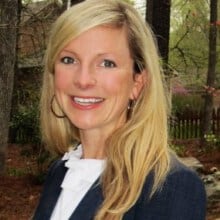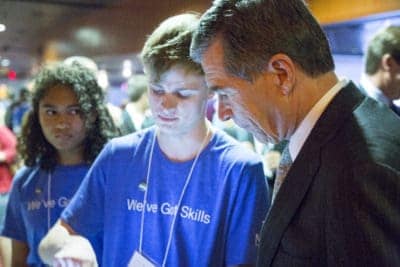It is a beautiful day on Wrightsville Beach, and a bus load of middle school students are walking toward the front doors of the Blockade Runner Beach Resort. Today, these students will be learning outside of the classroom. They will trade whiteboards and text books for a behind the scenes tour of a professional kitchen, the hotel reception desk, and exposure to some of the many other job opportunities within the hospitality industry (a 23-billion-dollar contributor to the state’s economy).
Some may ask why 12 and 13-year-old students need to spend time exploring work-place settings. After all, are they not years away from choosing a career? Indeed — but what many may not realize is that school attendance, engagement, and course selection during these middle-grade years are a strong predictor of a child’s high school graduation and post-secondary success. Thereby, it is important to allow students to explore careers as early as middle school. Doing so ignites interests, adds relevancy to classroom learning, and helps position students to make informed decisions about their futures.
The behind-the-scenes field trip at the Blockade Runner is part of a larger, statewide effort called Students@Work – a 10-day career awareness blitz designed to connect middle school students with employers and careers across North Carolina’s economic landscape. Founded by the North Carolina Business Committee for Education (NCBCE), an education non-profit housed in the North Carolina Governor’s Office, and in partnership with the NC Department of Public Instruction, Students@Work exposes students and teachers to real-world jobs and introduces them to some of the technical and employability skills they will need to attain those jobs.
Since its inception in 2012, the program has engaged more than 170,000 students. This year, Governor Roy Cooper joined student groups visiting the Blockade Runner in Wilmington as well as students participating in events hosted by Mission Health in Asheville and the Charlotte Motor Speedway in Concord.
“A well-trained workforce is critical to North Carolina’s success, and we know we have to start early with these kids, telling them all of their different options,” Governor Roy Cooper said. “It’s pretty exciting out there, all of the opportunities that they have.
“We’re just trying to make sure that they know that these businesses have jobs for them. Hopefully, these middle schoolers can not only learn about the hospitality industry, but they can learn about technology. They can learn about science.”
While career awareness activities like Students@Work comprise one stage of work-based learning, they are not the only type of efforts linking classroom learning to career learning. Career exploration and career experience are subsequent stages in the work-based learning continuum and include everything from science competitions and service learning projects to internships and apprenticeships. Work-based learning experts have learned that career awareness sparks interests and offers a glimpse into a future, career exploration creates space for students to explore those interests, and career experience paves the path toward skills development and career success.
North Carolina is one of six states selected by the National Governor’s Association to participate in a Policy Academy to Expand Work-Based Learning. Through this effort, NCBCE, the Governor’s Office, and leaders from the Community College System, the Department of Public Instruction, the Department of Commerce, and the NCWorks Commission are organizing employers and state entities to rally around one, consistent definition of work-based learning. The policy academy team’s work also involves inventorying and scaling existing programs, developing toolkits and best practices, launching pilot programs, and seeking to make this continuum of real-world learning a standard part of preparing students for real-life success.
Returning to the Blockade Runner where students are wrapping up rotations and preparing to board the bus to head back to school… Yes, they are still young, full of energy, and probably bemoaning the homework that awaits, but some will leave this experience thinking, “that is what I want to do when I grow up.” Others will leave with a new understanding of real-world uses for mathematics, language arts, or the importance of a firm handshake. Regardless of the takeaway, these are lessons that cannot be taught exclusively in a traditional classroom. Strong education is our pipeline to a strong workforce and work-based learning is a vehicle that will position students and employers alike to experience more and ensure our great state is job ready.
To learn more about Students@Work, visit http://ncbce.org/students-at-work/.
To learn more about North Carolina’s workforce development efforts including work-based learning, visit https://governor.nc.gov/news/governor-cooper-announces-nc-job-ready-key-priorities-workforce-development.




